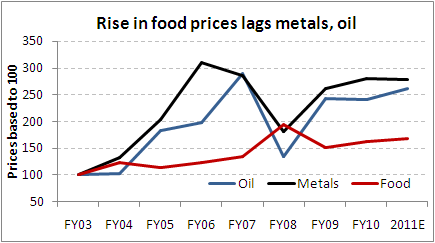India's Third Giant Leap
This Could be One of the Biggest Opportunities for Investors
- Home
- Todays Market
- Indian Stock Market News May 25, 2011
Inflation may still have a long way to go Wed, 25 May Pre-Open
The government and the RBI seem to be caught in a blame game. Each expecting the other to shoulder the responsibility of pulling out the economy from an inflationary tailspin.
The government on its part believes that a lower fiscal deficit will do a lot of good to the economy's long term well being. We whole heartedly agree with that. But raising fuel prices to bridge the fiscal gap may not be the ideal way to curb inflation.
The RBI has done more than what it can by using its monetary tools aggressively to rein in price rises. Hence the government's indifference to rise in consumer prices seems to irk the central bank. And hence the disagreement between the policy makers and the regulator.
No denying that both the government's and the RBI's arguments are backed by sound logic. Also, that both are in the best interests of the economy's long term future. Growth with the risk of high government debt or spiraling price rises cannot be sustainable. On the contrary, each could pose significant risks over a period of time. Hence arriving at an alternative way to combat deficit and inflation rather than raising fuel prices is imperative.
But what surprises us is the fact that both the government and the RBI are completely ignoring the risk of rise in food prices. As the following chart shows, the rise in food prices over the past decade has grossly lagged that in fuel and metals. In fact when based to 100 from 2003 onwards, the food prices internationally are almost 40% lower than oil and metal prices.

|
Agreed that food is more of a domestic commodity as against oil and metals that are international commodities. However, as the demand for food in international markets keep rising, the same will impact price levels in Indian markets as well. Also subsidizing food prices will lead to the same problems for the government that oil prices are posing currently.
Hence it is not just oil but also food prices that the government and the RBI need to worry about to iron out the long term threats to the Indian economy.
For information on how to pick stocks that have the potential to deliver big returns, download our special report now!
Read the latest Market Commentary


Equitymaster requests your view! Post a comment on "Inflation may still have a long way to go". Click here!
Comments are moderated by Equitymaster, in accordance with the Terms of Use, and may not appear
on this article until they have been reviewed and deemed appropriate for posting.
In the meantime, you may want to share this article with your friends!